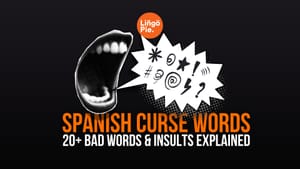Ever found yourself binge-watching a foreign language documentary and suddenly feeling inspired to learn the language? That's exactly what happened to me this week with "Uno: la historia de un gol".
As a total Spanish newbie, I realized that leaning into Salvadoran slang could be my ticket to language-learning success. After all, why stick to textbook phrases when you can learn the juicy, street-smart Salvadoran slang that'll actually turn heads?
In this post, join me as we explore the Salvadoran slang words and colloquial expressions that'll help you appreciate El Salvador even more. Trust me, this foreign country has a lot to offer...including its unique and colorful slang terms! Whether you're planning a trip, chatting with your friends from Latin America, or just want to learn Spanish in a new way, these phrases will add some serious sabor to your skills.

Salvadoran Slang Words
Chero
"Chero" is the quintessential Salvadoran word for a buddy or close friend. It's the local equivalent of "amigo," but with an extra dash of familiarity and warmth. When you hear Salvadorans throwing this word around in Spanish TV shows, you know they're talking about their inner circle.
- "Anoche salí con mis cheros a celebrar mi cumpleaños." (Last night, I went out with my buddies to celebrate my birthday.)
Aguja
In Salvadoran slang, "aguja" (literally meaning "needle" in Spanish) has a unique and positive connotation. It means that someone is very prepared or focused on a goal. This term likely evolved from the idea of being as sharp and precise as a needle, always on point and ready to tackle challenges.
- "Si querés tener éxito en este negocio, tenés que ser aguja." (If you want to succeed in this business, you need to be prepared and focused.)
Bayunco
"Bayunco" captures the essence of wild, exciting craziness in Salvadoran slang. It's not about being mentally unstable but rather describes situations or people that are off-the-charts amazing or unbelievably awesome.
- "El concierto de anoche estuvo bayunco, tocaron por tres horas sin parar." (Last night's concert was insane, they played for three hours straight.)
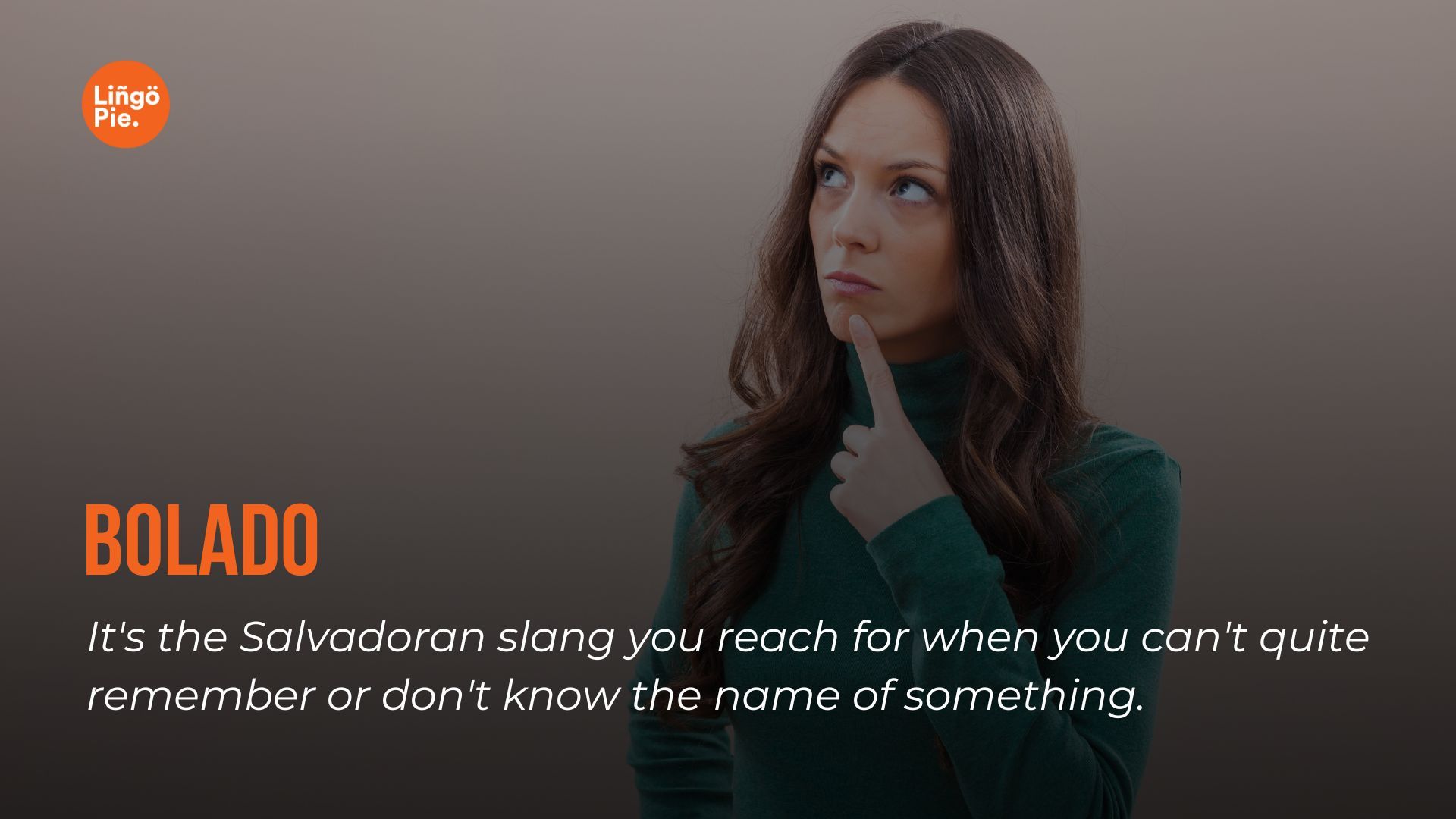
Bolado
In Salvadoran Spanish, "bolado" is the ultimate catch-all term you probably heard in Spanish comedy shows. It's the word you reach for when you can't quite remember or don't know the name of something. Think of it as the Salvadoran equivalent of "thingamajig" or "whatchamacallit."
- "¿Me prestas ese bolado que usas para abrir latas?" (Can you lend me that thing you use to open cans?)
Arrecho
In Salvadoran slang, "arrecho" means excellent, awesome, or great. It's used to describe something impressively good or exciting. Just remember, this word has different meanings in other Latin American countries, so use it cautiously outside El Salvador.
- "La comida en este restaurante está arrecha." (The food in this restaurant is awesome.)
Cacaso
In El Salvador, "cacaso" is the slang word a young person uses when something is a total letdown. It describes anything that's disappointingly bad, whether it's poorly made, looks awful, or bores you to tears. It's like the Salvadoran way of saying "what a disaster" or "what a flop."
- "La fiesta de anoche fue un cacaso total. Nadie bailó y la comida estaba fría." (Last night's party was a complete flop. Nobody danced and the food was cold.)
Baboso
In Salvadoran, the native speakers consider the term "baboso" to pack a bit more punch than its literal translation of "drooler". It's a colorful way to call someone a fool or an idiot, often used when someone's done something particularly thoughtless or annoying.
- "No seas baboso, ¡esa no es la forma de arreglar el carro!" (Don't be an idiot, that's not how you fix the car!)
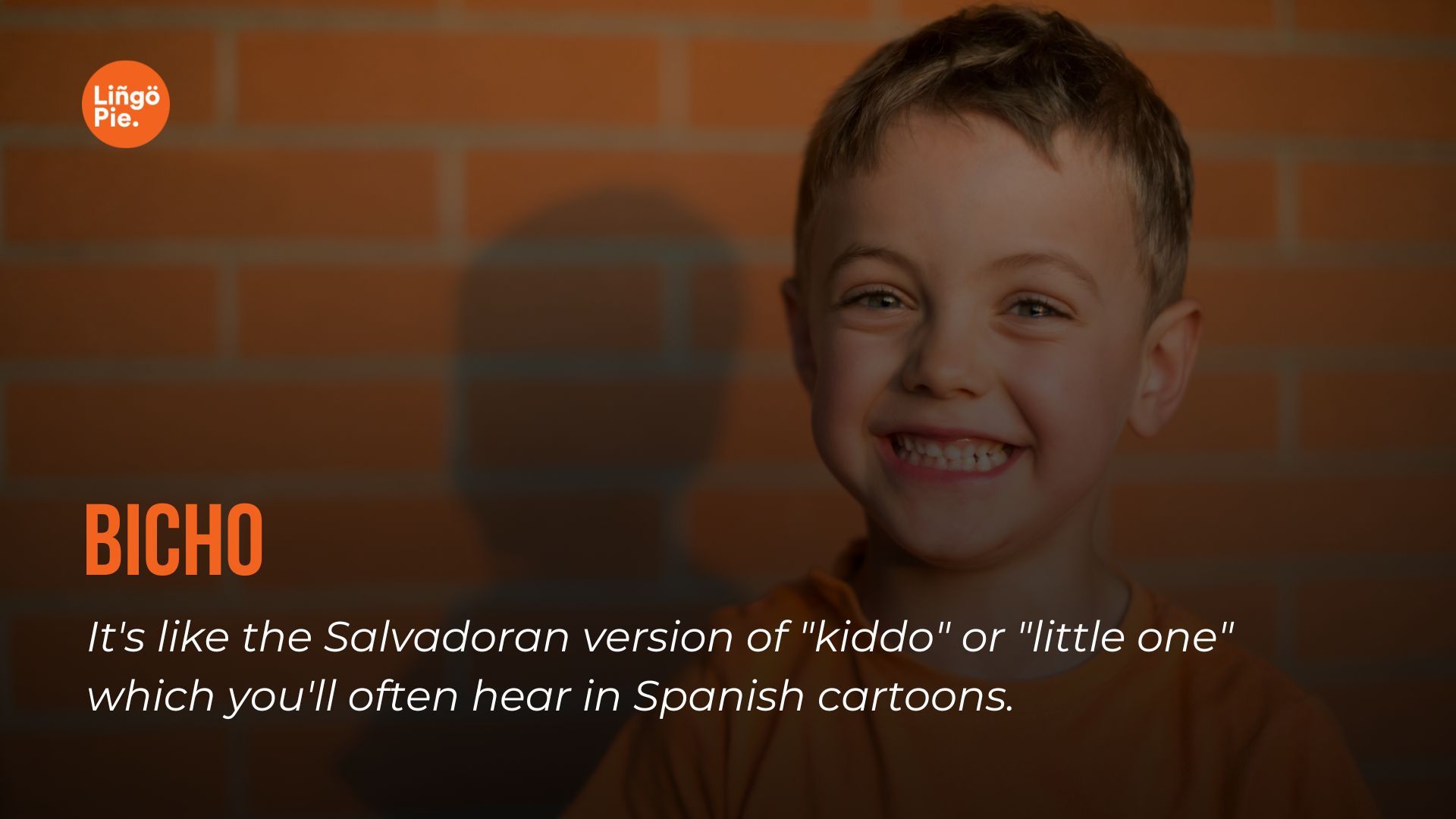
Bicho
In Salvadoran slang, "bicho" takes an endearing twist from its standard Spanish meaning of "bug." Here, it's a playful way to refer to children or anyone younger than the speaker. It's like the Salvadoran version of "kiddo" or "little one" which you'll often hear in Spanish cartoons.
- "Los bichos de mi hermana son unos traviesos." (My sister's kids are such mischief-makers.)
Cipote
"Cipote" is a broader term for young people in El Salvador, distinct from "bicho" which typically refers to small children. "Cipote" can describe anyone from older kids to teenagers and even young adults. It's often used when talking about youth in general, their behavior, or generational differences.
- "Los cipotes de mi barrio organizaron un torneo de fútbol." (The young people in my neighborhood organized a soccer tournament.)
Chillar
It's used to describe reactions ranging from angry outbursts to dramatic displays of frustration, often over situations that seem trivial to others.
- "No le digas que perdiste su libro, va a chillar como loco." (Don't tell him you lost his book, he's going to flip out.)
Zurumbo
"Zurumbo" is a versatile word in Salvadoran slang that can describe both a physical and mental state. It primarily refers to feeling dizzy or disoriented, but it can also be used to call someone slow-witted or confused.
- "Después de tantas vueltas en el juego mecánico, salí todo zurumbo." (After so many spins on the ride, I came out totally dizzy.)

Dundo
"Dundo" is a sharp way to call someone slow on the uptake or dense. It's harsher than just saying someone's confused - it implies a stubborn kind of cluelessness. People might use it when frustrated with someone who's not getting a simple concept, despite clear explanations.
- "Me siento dundo, no entiendo nada de esta clase de matemáticas." (I feel stupid, I don't understand anything in this math class.)
Chivo
For the Salvadoran people, "chivo" is the go-to word for all things positive. It's a versatile term that can mean great, cool, awesome, or fantastic, depending on the context. Salvadorans use it to express approval or satisfaction with just about anything - from a tasty meal to a fun night out, or even a job well done.
- "La fiesta estuvo chivo, bailamos toda la noche." (The party was great, we danced all night.)
Salu
"Salu" is a quirky Salvadoran farewell that might throw off Spanish learners. Despite looking like a shortened version of "salud" (health), it's actually used to say goodbye. This casual sign-off adds a friendly touch to parting words, similar to saying "catch you later" or "see ya" in English.
- "Me tengo que ir, salu a todos!" (I've got to go, bye everyone!)
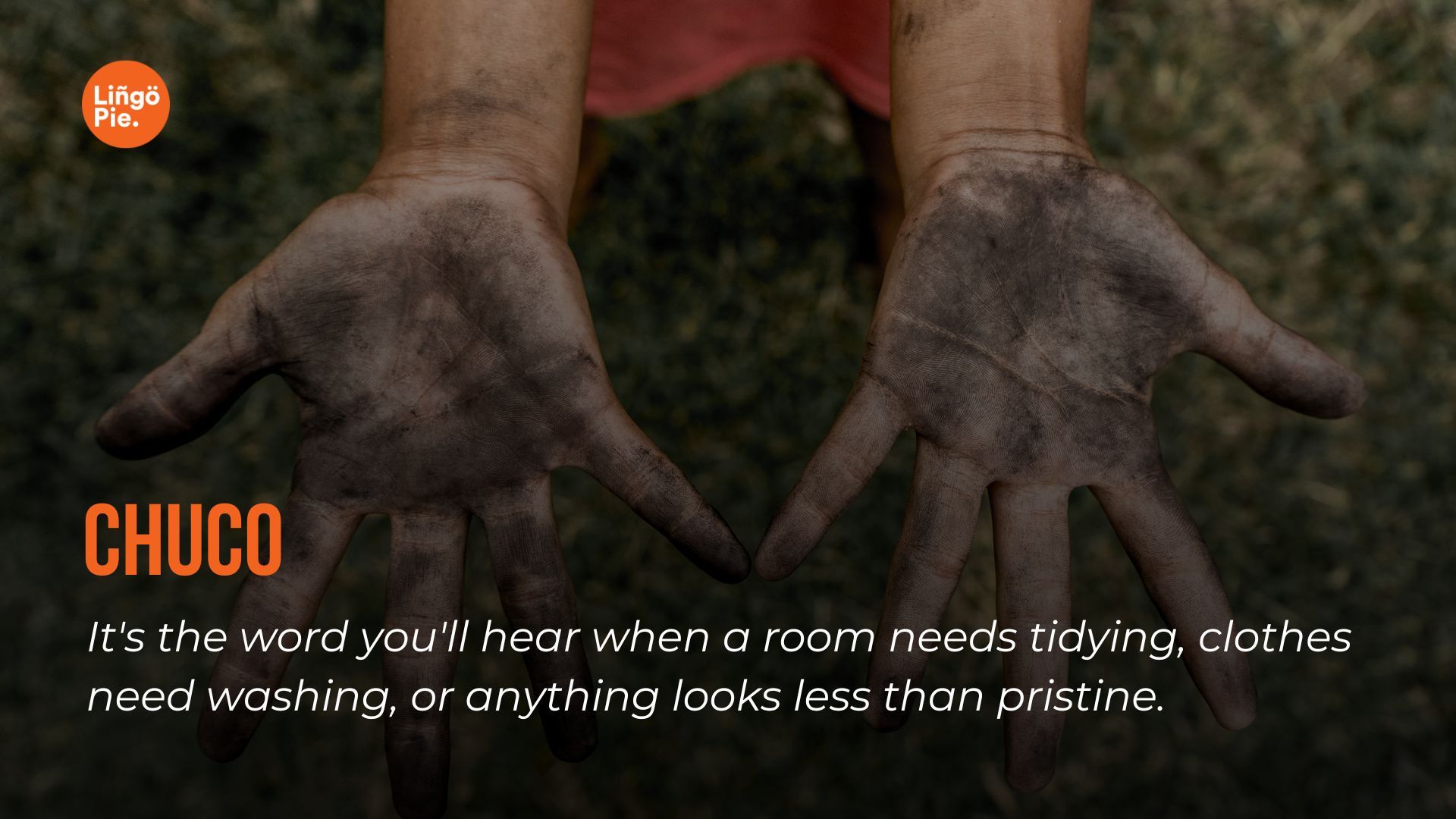
Chuco
"Chuco" cuts straight to the point when describing something dirty or messy. It's the word you'll hear when a room needs tidying, clothes need washing, or anything looks less than pristine. This blunt descriptor doesn't pull any punches – if it's "chuco," it definitely needs cleaning.
- No uses ese vaso, está chuco." (Don't use that glass, it's dirty.)
Puya
"Puya" (or its variant "Puchica") serves as a milder, more socially acceptable version of a stronger Spanish curse word. It's the go-to exclamation for moments of surprise, shock, or frustration when you need to watch your language.
Think of it as the Salvadoran equivalent of "Geez!" or "Holy cow!" - strong enough to express your feelings, but tame enough for most company.
- "¡Puya! Se me olvidó pagar la cuenta de luz." (Darn! I forgot to pay the electricity bill.)
Embolar
"Embolar" is the Salvadoran slang way of talking about getting drunk or being intoxicated. When someone says they're going to "embolar," they're planning on having more than just a casual drink - they're aiming for a proper night out where sobriety is left at the door.
- "Después de los exámenes, todos nos fuimos a embolar para celebrar." (After the exams, we all went out to get wasted to celebrate.)
Why Learning Salvadoran Slang is Crucial for Spanish Learners
While standard Spanish is the official language of El Salvador, the country's unique slang words and colloquial expressions add flavor to everyday conversations. So for anyone looking to learn Spanish, especially with a focus on Central America, mastering Salvadoran slang terms is essential.
These slang words often have several meanings that differ from their literal translations, making them challenging yet fascinating for language learners. From describing a young person as a "cipote" to using "chivo" to express good vibes, these words paint a vivid picture of Salvadoran life.
Plus, here's another fact: Native speakers, particularly young people, pepper their speech with slang, making it crucial for effective communication. So if you want to connect with the locals, be sure to use these commonly used slang expressions.

Learn Salvadoran Slang With Lingopie
One effective way to immerse yourself in Salvadoran slang is through Lingopie, a language learning platform that uses native content to teach real-world Spanish. With Lingopie, you can watch Salvadoran TV shows and movies with interactive subtitles, allowing you to learn slang words and phrases in context.
This binge-learning method with hit Spanish TV shows and Movies can help you understand not just the literal meaning of slang terms, but also their cultural significance and proper usage.
By hearing native speakers use expressions like "Qué chivo" or "Está yuca" in natural conversations, you'll quickly pick up on the nuances of Salvadoran Spanish.
So what are you waiting for? Give Lingopie a try today!
FAQs: Learning Salvadoran Slang
Q: Why is Salvadoran slang different from other Spanish-speaking countries?
A: Salvadoran slang has evolved uniquely due to El Salvador's specific cultural, historical, and geographical influences. While it shares some similarities with other Central American countries, many terms are distinctly Salvadoran, reflecting the country's particular experiences and lifestyle.
Q: How can I practice Salvadoran slang if I don't live in El Salvador?
A: Platforms like Lingopie offer an excellent way to immerse yourself in Salvadoran Spanish. You can watch Salvadoran TV shows and movies with interactive subtitles, helping you learn slang in context. Additionally, joining online Salvadoran communities, listening to Salvadoran podcasts, and finding language exchange partners from El Salvador can greatly enhance your learning.
Q: Will using Salvadoran slang make it harder for other Spanish speakers to understand me?
A: While some Salvadoran slang terms might be unfamiliar to Spanish speakers from other regions, most will understand you through context. Using slang appropriately can actually enhance your communication skills and show cultural awareness. However, it's always good to gauge your audience and adjust your language use accordingly.
Q: How often is slang used in everyday Salvadoran Spanish?
A: Slang is very common in informal, everyday conversations in El Salvador, especially among younger people. However, in formal settings or professional environments, standard Spanish is typically used. Learning when and how to use slang appropriately is part of mastering Salvadoran Spanish.
Q: Can Lingopie help me understand the cultural context behind Salvadoran slang?
A: Yes, Lingopie's use of authentic Salvadoran content helps learners understand not just the words, but also the cultural context in which they're used. By watching real Salvadoran shows and movies, you'll gain insights into situations where certain slang terms are appropriate, the tone they convey, and the cultural nuances they express.


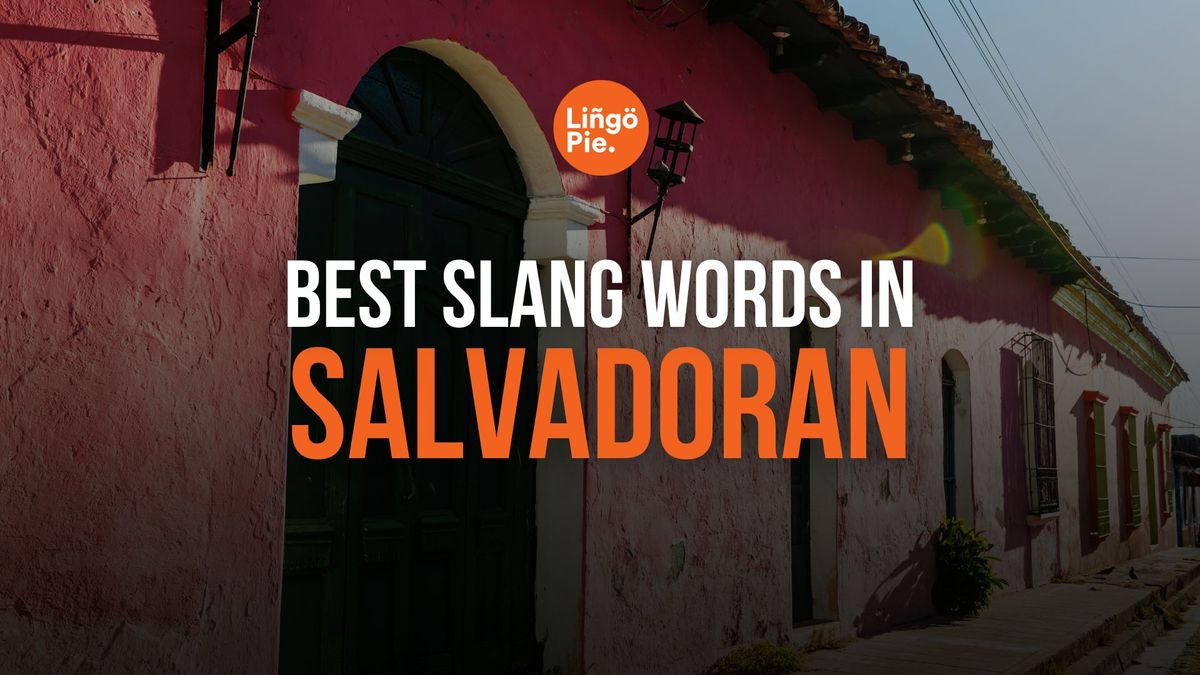




![19 Best Spanish Series For Learning Spanish Fast [2026]](/blog/content/images/size/w300/2025/04/best-shows-to-watch-to-learn-spanish.jpg)
![How to Learn Spanish with News in Easy Spanish [Guide]](/blog/content/images/size/w300/2024/12/How-to-Learn-Spanish-with-News-in-Easy-Spanish.jpg)
![80 Spanish Love Words Every Romantic Should Know [Guide]](/blog/content/images/size/w300/2025/10/spanish-love-words.jpg)
